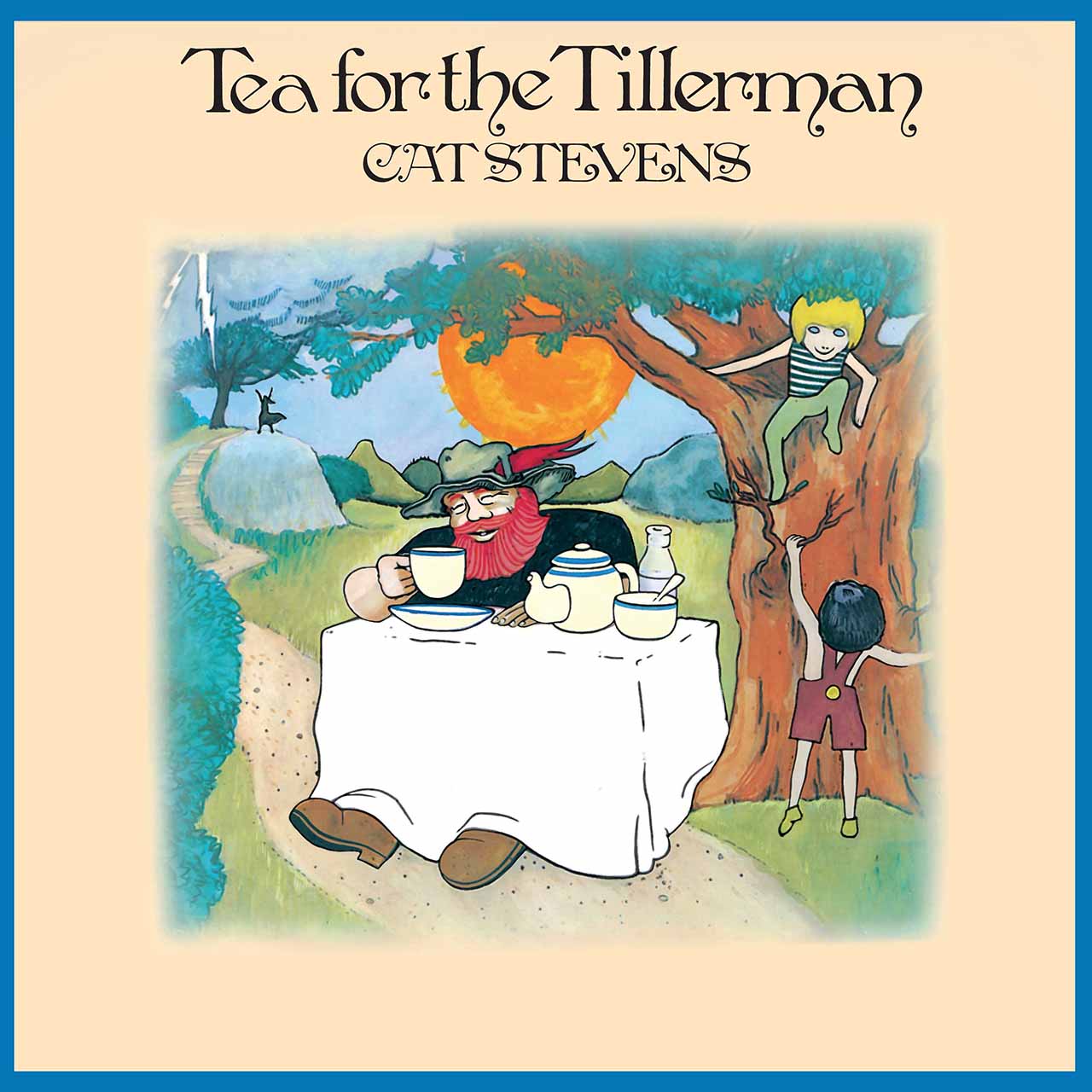Cat Stevens began the 1970s determined to make up for lost time. Just a month after the April 1970 release of Mona Bone Jakon, an album made in the wake of his recovery from tuberculosis, Stevens began recording his all-time classic, Tea For The Tillerman.
While Mona Bone Jakon represented rebirth, of an artist taking control and redefining the parameters of his songwriting, Tea For The Tillerman gave a sense of Stevens refining his work and seizing his moment. He did this with a collection of songs that spoke to a generation about things that mattered to them – the increasing influence of technology, the environment, relationships, searching for a spiritual balance, society’s expectations, the generation gap, and more.
Listen to the Cat Stevens album Tea for the Tillerman now.
Adding to the sense of Tillerman as a more worldly sequel to Mona Bone Jakon, Stevens called upon the same band that had served him so well on that album – Harvey Burns (drums), Alun Davies (guitar) and John Ryan (double bass) – with Paul Samwell-Smith back in the producer’s chair.
“Where Do The Children Play?” eases the listener in with Stevens and Davies’ subtle acoustic guitar interplay, again suggesting a distillation of Mona Bone Jakon’s warm analogue sound. As the song opens up, adding layers of gentle, carefully chosen instrumentation, it becomes clear that, once more, the music serves to communicate Stevens’ message. The lyric was decades ahead of its time, voicing concerns about the environment, the creeping culture of instant gratification and the pervading influence of technology. It was inspired by Stevens’ upbringing in the metropolitan heart of London, as he told Forbes in 2020, “When we’re talking now about ecology and saving this planet ‘Where Do The Children Play’ was a flagship for that, for me anyway, just to get that message out. And that all grew out, strangely, of a simple thing, which is when I was a kid I was locked into the cement world. There was no place nearby I could go and enjoy a little bit of greenery. All the playgrounds were like concrete and especially my school… That was how that song grew.”
Tillerman is full of songs that speak to the concerns of a generation who’d come of age in the 1960s, bristling against the world they’d inherited from their parents. With “Father And Son”, Stevens wrote a dissection of the generation gap to rank alongside The Beatles’ “She’s Leaving Home” and The Who’s “My Generation.” “Father And Son” came from an unlikely place, however: The song was originally written for Revolussia, a musical about the Russian Revolution that Stevens was developing with British actor Nigel Hawthorne. “Essentially, it was about Nicholas and Alexander, the last tsars of Russia, and against that there’s another story about this family in the farmland,” Stevens told GQ in 2020. “And the father, of course, basically wants to keep things as they are, while the son is really inspired by the revolution. He wants to join… That’s why I’m able to represent both sides – though I feel that my preference, my emphasis, was on the son’s side, and the father’s arguments were not quite as strong as the son’s, which is interesting. Change is basically the theme of the song.”
“Father And Son”’s empathetic take on the generation gap has moved many to cover the song, including Johnny Cash and Fiona Apple, Rod Stewart, Richie Havens, and Irish boy band Boyzone, who had an international hit with it in 1995. Its evergreen appeal has led to it soundtracking pivotal scenes in TV and film, including Ted Lasso and Guardians Of The Galaxy Vol 2. But Stevens’ resistance to it being used in the 1970 film Deep Water, starring Jane Asher, led to another of Tea For The Tillerman’s highlights. “I said, ‘No, no, you can’t use ‘Father And Son,’ because it’s for a musical opera,’” Stevens told Entertainment Weekly in 2020. “So I tried to get out of it by saying I’ll write another song that was similar.”
The result was “But I Might Die Tonight,” a take on the generation gap that asked big questions of parental and societal expectations. Stevens rallies against a drab life of conformity, echoing how many of the post-Woodstock generation were feeling (“I don’t want to work away/Doing just what they all say/’Work hard boy and you’ll find/One day you’ll have a job like mine’”). It’s another song that has gained a deeper meaning over the years, as Stevens told Entertainment Weekly: “’But I Might Die Tonight’ has a message that’s consistently relevant to so many people. We talk about corporate companies, and they’re getting bigger and more monstrous as time goes on. Now they’re bigger and more powerful than governments! Either you belong to a company or you don’t belong. If you don’t belong to a company, you’re in the danger zone. You’re likely to be wiped off. That song is talking about people who feel that life is in somebody else’s hands.”
Elsewhere, the search for spiritual fulfillment which Stevens began documenting on Mona Bone Jakon is continued in earnest on “Miles From Nowhere” and “On The Road To Find Out,” the latter of which begins with hints of The Beatles’ “Blackbird” before an intense Balkan groove takes hold. Reflecting in 2020, Stevens suggested “On The Road” “almost foretold, in very prescriptive terms, what was going to happen to me and my [faith]. ‘Yes, the answer lies within, so why not take a look now/Kick out the devil’s sin/Pick up a good book now.’ Before I received any book, I was writing about this book that was going to change my life. And wow.”
But the song that did the most to establish Stevens as a major star was the soulful word of caution “Wild World.” The song has often been interpreted as a send-off to an ex-lover, though Stevens offered another perspective when interviewed in 2009 on The Chris Isaak Hour, “It wasn’t me writing about somebody specific… it was more about me. It’s talking about losing touch with home and reality – home especially.” Amazingly, considering Stevens’ version of the song would propel him to a new level of stardom, he wasn’t overly fond of it at first and wasn’t even sure if he’d release it himself. That changed when Jimmy Cliff’s cover of the song, using a backing track put together by Stevens and Samwell-Smith, became a No 8 hit in the UK in August 1970. When Tea For The Tillerman was released three months later, Stevens was persuaded to include his own version.
It was obvious to those who heard it that Tea For The Tillerman was a great album. Island Records boss Chris Blackwell later told VH1. “One of the best moments of my life in the record business was hearing the playback of Tea for the Tillerman. I remember very clearly hearing it and hearing the first track then thinking, ‘Wow, this is fantastic,’ and the second and the third and the fourth and the fifth. I’d never heard a record as good as that.”
But even Blackwell may have been surprised by the extent of the album’s success. The album went three times platinum in the US and made Stevens an international star. More importantly, a staggering number of people have felt a deep connection with its stunning songs and lyrical themes over the years. Stevens himself has some ideas about why that may be, as he told Sound On Sound in 2020. “The songs are vital messages for the world community and what we’re going through. They have become quite profound. I think the secret here is that I was incredibly sincere with what I was doing. It wasn’t just me trying to do and make another pop song, it was me trying to express myself, my thoughts and what I was experiencing and thinking and learning.” We’re still learning from him today.




